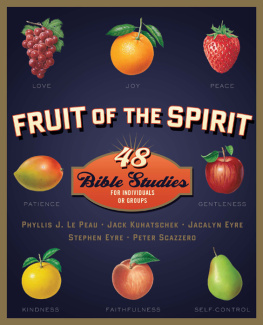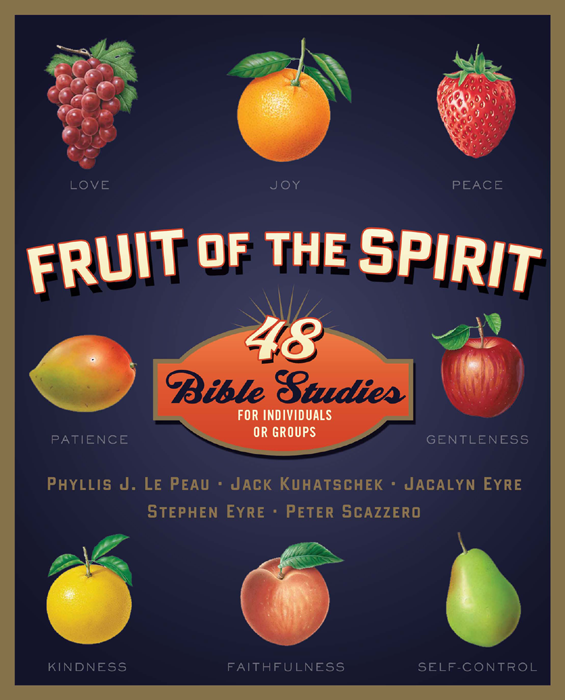
FRUIT OF THE SPIRIT
Bible Studies
FOR INDIVIDUALS OR GROUPS

P HYLLIS J. L E P EAU J ACK K UHATSCHEK J ACALYN E YRE S TEPHEN E YRE P ETER S CAZZERO



Tibe fruit of the Spiritislove, joy, peace, forbearance [patience], kindness, goodness, faithfulness, gentleness and self-control. Against such things there is no law. (Galatians 5:2223)
Every Christ follower aspires to a life defined by these character traits. Yet living them out is as much a challenge today as it was when the apostle Paul addressed them to the believers in Galatia two thousand years ago and possible, now as then, only when one walks daily in step with Gods Spirit.
This study was written to help you do just that: to allow the Spirit of God to use the Word of God to produce his fruit in your life. First published as eight individual studies more than twenty years ago, the content has benefited more than a half million men and women as theyve sought to grow in their Christian faith. While the children of the five authors have become adults with children of their own, the truths presented are as fresh and relevant as ever.
To get the most from this study, you need to understand a few basic facts:
It is designed to be flexible. You can use it in your individual quiet times or for group discussion (small groups, neighborhood Bible studies, etc.).
It is organized chronologically based on the Galatians 5 passage starting with love and ending with self-control (kindness and goodness are treated as a single entity). You can study the fruit of the Spirit in any order that is best for you or your group. There are six studies per trait.
Each of the forty-eight studies deliberately focuses on only one or two passages. That allows you to see each passage in its context, avoiding the temptation of proof texting and the frustration of Bible hopscotch (jumping from verse to verse). If you would like to look up additional passages, a Bible concordance will give the most help.
The questions help you discover what the Bible says rather than simply telling you what it says. They encourage you to think and to explore options rather than to merely fill in the blanks with one-word answers.
Resource boxes accompany some of the questions to enrich your time in Gods Word. These helps include explanations of words from the original biblical languages, cultural or historical notes, pertinent quotations from Bible scholars, and comments from the author of the study.
An approach question (Warming Up), prayer suggestions, and application ideas are also provided for each study. The approach question is designed to reveal where your thoughts or feelings might need to be transformed by Scripture. Thus it is best to answer it before reading the passage.
SUGGESTIONS FOR INDIVIDUAL
1. Begin each study with prayer. Ask God to help you understand the passage and apply it to your life.
2. A good modern translation, such as the New International Version, the English Standard Version, or the New Living Translation, will give you the most help. However, the questions in this guide are based on the New International Version.
3. Read and reread the passage(s). You must know what the passage says before you can understand what it means and how it applies to you.
4. Write your answers in the space provided. This will help you to clearly express your understanding of the passage.
5. Keep a Bible dictionary handy. Use it to look up any unfamiliar words, names, or places.
SUGGESTIONS FOR GROUP STUDY
1. Come to the study prepared. Careful preparation will greatly enrich your time in group discussion.
2. Be willing to join in the discussion or to encourage discussion if you are leading the group. Plan to share what God has taught you in your individual study.
3. Stick to the passage being studied. Base your answers on the verses being discussed rather than on outside authorities such as commentaries or your favorite author or speaker.
4. Try to be sensitive to the other members of the group. Listen attentively when they speak, and be affirming whenever you can. This will encourage more hesitant members of the group to participate.
5. Be careful not to dominate the discussion. By all means, participate! But allow others to have equal time.
EBOOK INSTRUCTIONS
In this ebook edition, please use your devices note-taking function to record your thoughts wherever you see the bracketed instructions [Your Response].

Love
BUILDING LASTING RELATIONSHIPS
Peter Scazzero
In the film entitled Cipher in the Snow, a young school-age child is waiting for a school bus on a cold January morning. The other children are playing and laughing with one another, while Roger stands alone, staring at the ground. When the bus arrives, he is the last one to climb the steps. While others talk and joke together, Roger sits alone behind the bus driver. After a few miles, Roger stands up, drops his books, and leans on a metal pole to steady himself. Finally, the bus driver pulls over to the side of the road and opens the door. Roger staggers out into the roadside and falls into the snow dead.
While the autopsy sheds no light on his death, research into his life does. His parents had divorced and his mother remarried. His new stepfather resented Rogers intrusion into their marriage. His mother spent almost no time with him.
As a result, he began withdrawing from other friends at school and became apathetic toward his schoolwork. Slowly, Roger built around himself a world of silence. Both teachers and friends eventually grew tired of entering that world.
In only a few months, everything and everyone of value to Roger had been either lost or taken from him. With no place of shelter and no words of encouragement, he felt like a cipher an empty zero. This sensitive child was unable to stand the pain for long. Roger was not killed by an infirmity or a wound. He was killed by a lack of words of love and acceptance.
This powerful story illustrates the deep human need within each of us to receive love from others. Many of the believers and visitors who attend our churches are like Roger. They are desperately lonely and searching for genuine relationships. They come with a profound need for love and acceptance from the Lord Jesus and from us.
This section of Fruit of the Spirit explores the mysterious and many-faceted nature of love from a biblical perspective. The ultimate goal of these six studies is to allow the world to see God and to experience his love through us. As the apostle John writes, No one has ever seen God; but if we love one another, God lives in us and his love is made complete [literally, comes to full expression] in us (1 John 4:12).


















